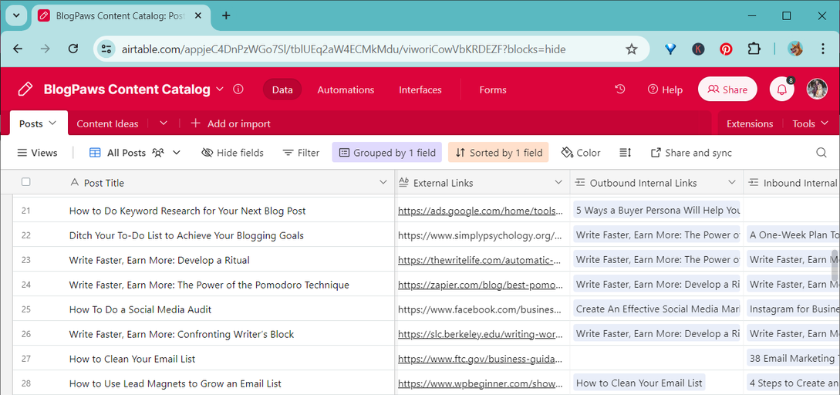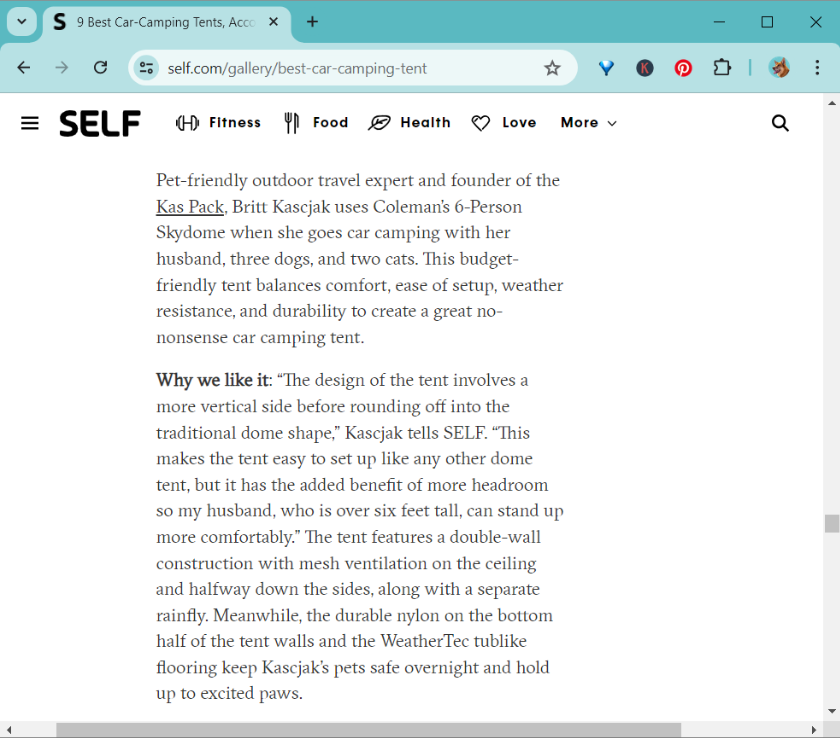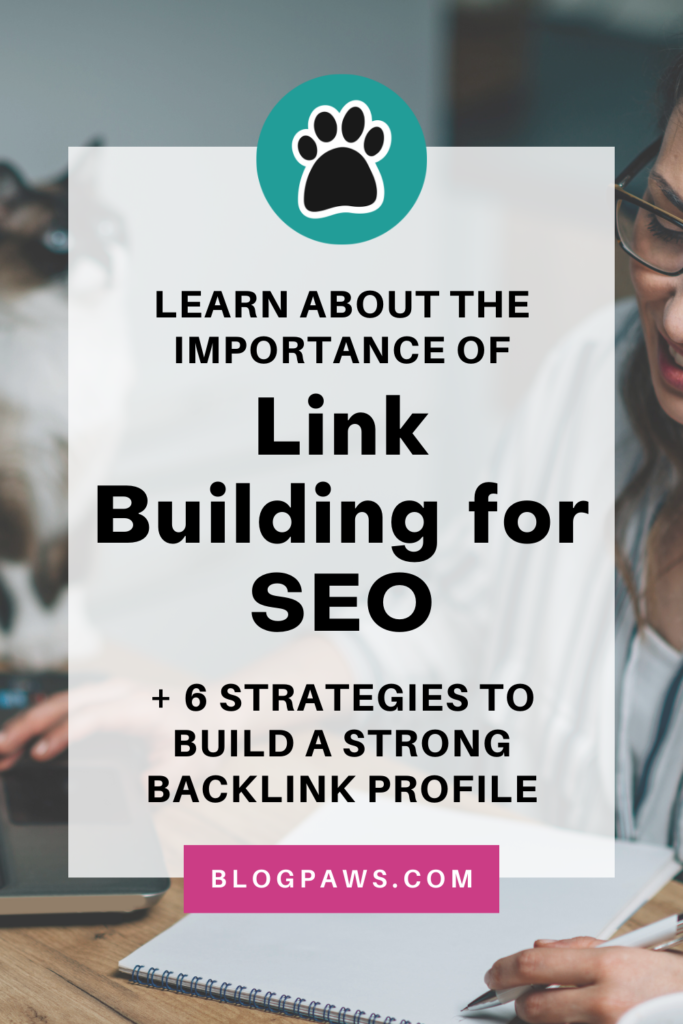Understanding the Importance of Link Building for SEO
You’ve poured your heart into creating informative, engaging content to help and empower pet parents with your knowledge and experience in the pet space. But with more than 2.5 billion blog posts published every year, how do you stand out and reach your ideal readers?
Many experts stress the importance of search engine optimization (SEO)—and they aren’t wrong! However, SEO is a big topic that has many different elements.
So, let’s break it down a little further…This blog post will look specifically at one factor in your greater SEO plan. Let’s talk about how strategically acquiring links from high-quality websites can help boost your visibility online, build authority in your industry, and attract your target audience.
What is Backlink Building?
Link building refers to the process of acquiring links to your blog or website. This includes links from your own content to other parts of your website, as well as links from other websites.
Also known as “backlinks,” these links signal to Google and other search engines that your content is trustworthy and valuable. After all, other content owners and small business owners aren’t going to link to your content if it has nothing to offer their audience.
Is Link Building Still Relevant to SEO?
In recent months, many “gurus” have claimed that link-building for SEO is a waste of time. This was further driven by statements from people associated with the search giant, like Gary Illyes, saying that links are not considered in the top three ranking factors.
However, as we already mentioned, many factors are incorporated into determining which content will rank in the top spots in the Google SERPs – page speed, user experience on your website, content quality, search intent, keyword optimization, social signals, etc. With so many factors included in the algorithm, it’s important to consider more than just the top three ranking factors in your overall search performance.
Remember the buzz about Google’s E-E-A-T algorithm and the importance of positioning yourself as an industry expert? Building a robust portfolio of backlinks from relevant websites in your niche is a powerful way to demonstrate your authority and expertise, a point often overlooked in the debate about the relevance of link-building today.
While we don’t know the level of importance Google assigns to backlinks in the algorithm, we do know that they are tracked and, therefore, considered to some degree. The recent leak of Google search-related documentation confirmed this, revealing that Google is, in fact, still tracking links even if it is downplaying their importance.
Internal Links Vs. External Links
Now that we have established that links are a piece of the greater SEO puzzle, let’s look more closely at the types of backlinks in SEO and how they may impact your online presence. This includes both internal and external links.
Internal Links
Internal links are links placed on one page of your website that link to another page of your website. They are often used to direct users to another blog post or product related to the information you are discussing, building upon their user experience. For example, if you refer to another related topic but have a blog post that goes into it in depth, you can link to it for those who want to keep reading.
These links also help to signal website crawlers, like those used by Google, demonstrating which blog posts are related. It helps establish that this isn’t a one-off article – that you are an authority on the topic, covering it in detail on your website.
External Links
External links are links placed on other websites linking back to your content. They play a significant role in building your website’s credibility and signal to search engine crawlers that your content is valuable and trusted by others in the field. This can significantly boost your search engine ranking, as it demonstrates that your website is a reliable source of information.
Links from other websites can also help you reach new eyes, allowing you to build your community of loyal followers and readers. Having discovered another creator or business they trust is linking to you introduces your content as something they may find interesting.
How to Track Your Link-Building Efforts
There are several ways you can track your internal and external links. This could include introducing a new tool into your routine or expanding your use of something you are already actively using.
Internal links are easier to track and stay on top of as they are 100% under your control. You can create a spreadsheet tracking what posts each of your blog posts link to, add it to your content briefs (this will also help if you are working with multiple writers), or add it as a column in your existing content catalog.
Here at BlogPaws, we use Airtable to create an in-depth content catalog with all the information we may need in one place. For each blog post, this includes:
- Inbound internal links
- Outbound internal links
- Outbound external links
Tracking your inbound external links can be more challenging. The biggest reason is that another website owner can add or remove a link without contacting you. However, many popular SEO tools include link tracking to make this process easier.
Two that I use and compare (as no tool is 100% accurate) in my own link-building include the free accounts on Ahrefs (Backlink Profile) and Semrush (Backlink Analytics).
6 Link Building Strategies for Small Business Owners & Entrepreneurs
If links are valuable for those trying to boost their performance in the SERPs, this raises a couple of key questions: How do you earn more backlinks for your website? Is there a secret to gaining backlinks to your website?
Here are a few effective link-building strategies for SEO to help you get started:
Submit to Directories
Find online directories specific to your niche or industry and submit your website to reach new creators. After all, no one will link to your content if they never see it. But be cautious when choosing directories! There are many spammy directories out there. Links from those sites can do more harm than good in the eyes of search engines like Google.
Watch for directories that are selective about who they include and require submissions to go through an approval process. For example, if your online pet business also has a brick-and-mortar location, submitting it to a website like BringFido will provide you with a beneficial backlink while helping you gain attention in the pet space.
Consider Broken Link Building
Are there specific websites in your industry from which you would like to earn a backlink? If so, this tactic will help you gain a backlink by solving a problem for them. Take time to look at some of their content relevant to your website and your business, checking the links they currently include. The goal is to find a broken link currently in their content.
When you find a broken link, contact the website owner and share your findings. Let them know which link is broken, and offer a link of your own that would fit that spot in their content. Ensure your email or DM is written professionally and with a bit of personality, avoiding coming across as a spam copy/paste message.
The truth is that finding and updating broken links takes time. For website owners with a lot of content, it’s A LOT. This approach means offering them an easy solution and saving them time. It’s much easier to take your recommended update and implement it than it would be to do all the leg work themselves.
Offer Expert Quotes to Journalists
One of my favorite approaches to link building for SEO is to use websites that connect journalists and large content creators with experts like yourself. These websites allow you to sign up and receive daily emails full of opportunities in various niches.
If you see an opportunity that speaks to your expertise, you can pitch the journalist, offering a quote for them to include in their content. If they use your quote, you are credited, earning a backlink. I used this tactic to gain backlinks from big sites like SELF and the Associated Press.
Several different sites offer this service free of cost for those interested, including:
You can also find pitches on social media platforms like X by following relevant hashtags like #JournoRequest or #PRRequest.
Guest Blogging, Podcasts, Etc.
One way to earn a guaranteed backlink is to put yourself out there to help create content for others. This could be by writing a guest post for another website in the industry, guesting on a podcast, or participating in a video with another creator.
Try joining online communities (like the BlogPaws Community) where you can connect with others in your niche. When pitching a guest post or podcast, don’t just contact them saying, “I’d like to write a post for you.” Instead, take it a step further by pitching a specific blog post or podcast idea that would appeal to their audience and fit your expertise.
For example:
- If you’re a dog trainer, offer a solution to a common training problem
- If you’re a cat groomer, share tips for preventing mats in a cat’s long coat
- If you run a pet product business, discuss a situation where your product could
Ensure you clarify how a link can be incorporated into the content during the planning stage. While some bloggers will allow you to add relevant links within the content, others prefer to include a link only in the byline.
Use your author byline to highlight your expertise, helping readers (or viewers/listeners, depending on the content) see why they should check out your website.
Add Infographics and Interactive Tools to Posts
Do your blog posts include anything worth linking back to? If not, maybe it’s time to consider how you can increase the value for other bloggers and content creators.
One easy way to boost the value of your content is to summarize it in an infographic that other creators and experts in your industry will want to share. Canva offers easy-to-use templates that will allow you to create an eye-catching infographic even if you don’t excel in graphic design (trust me, it’s not my strong point). Make sure you include enough information for the infographic to be valuable as a standalone piece of content, but back it up with a blog post that elaborates further, giving people a reason to click through and keep reading.
Another option is to create an interactive tool that could benefit others in your industry. For example, if you are a canine nutritionist or a nutrition-focused blogger, you may want to create an online calculator that helps pet parents determine how much of their chosen food to give their dogs.
Collect and Share Original Data
Much like the last point, sharing original data in your content boosts its value, making it more enticing for others in your niche to share. Consider the blog posts or online articles you have recently viewed. Did they refer to stats or data? If so, did they include a link with those stats to verify their accuracy? This is where the opportunity lies.
Consider opportunities to collect your own unique data firsthand. Could you conduct a study relevant to your expertise? Do you have a community that you could poll to offer interesting insights into their thoughts and buying habits? Don’t just collect this data – summarize it and create shareable statistics relevant to conversations in your industry.
PRO TIP: I can’t mention link-building best practices without reminding you to check your external links occasionally for broken links. Use a free tool like Online Broken Link Checker or the Ahrefs Free Broken Link Checker to find and update or remove them. Too many broken links can hurt your SEO efforts and the trust you’re building with your community.
Final Thoughts: Link Building for SEO
Whether you’re building links to reach new eyes or trying to boost your authority in the eyes of search engines like Google, links still play a vital role in digital marketing today. As a content creator or small business owner, this means that you should be incorporating them into your digital marketing efforts. It doesn’t have to be complicated!
Track and include internal links where they fit naturally and help improve the user experience.
For external links, create high-value content with original graphics and data where possible. Consider guesting on podcasts, writing guest posts, or offering expert quotes to earn backlinks from prominent publications. Most importantly, focus on adding something to the conversation!
What steps do you take to build your backlink profile? Share your link-building tips in the comments to help others in the community!
About the Author: Britt Kascjak, BlogPaws Director of Content & SEO, is an award-winning freelance writer whose background in digital and social media marketing spans 15+ years. She’s been a content creator in the pet industry for 9+ years with her own blogs: Shed Happens, The Kas Pack, and Lucifer the Rescue Pup where she shares her life and outdoor adventures with her 2 dogs and 3 cats. Read more…








